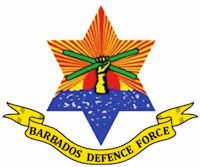Barbados Defense Force (BDF) - History
 The Barbados Defence Force (BDF) was established in 1978 as a force completely separate from the RBPF. It has played a leading role in the RSS. Within the RSS framework, Barbados contributed the highest percentage of the system's budget, provided BDF headquarters as the RSS base of operations (and the BDF chief of staff as RSS coordinator), and informally earmarked the BDF as the primary regional reaction force in crisis situations. This understanding may have been abandoned, however, when the BLP government was voted out of power in May 1986. Domestically, the BDF was a somewhat controversial institution insofar as its existence underscored the Barbadian (and, one might well say, the Caribbean) ambivalence toward established military organizations.
The Barbados Defence Force (BDF) was established in 1978 as a force completely separate from the RBPF. It has played a leading role in the RSS. Within the RSS framework, Barbados contributed the highest percentage of the system's budget, provided BDF headquarters as the RSS base of operations (and the BDF chief of staff as RSS coordinator), and informally earmarked the BDF as the primary regional reaction force in crisis situations. This understanding may have been abandoned, however, when the BLP government was voted out of power in May 1986. Domestically, the BDF was a somewhat controversial institution insofar as its existence underscored the Barbadian (and, one might well say, the Caribbean) ambivalence toward established military organizations.
The circumstances that led then-Prime Minister Tom Adams to create the BDF were unsettling and worrisome to the government and to many Barbadians. Adams's October 1976 announcement of an aborted attempt by two United States nationals to seize power with the aid of mercenary forces (and, five days after the announcement, the explosion and crash of a Cuban airplane at Grantley Adams International Airport) exposed the vulnerability of small island governments to destabilization by outside forces (just as the 1979 overthrow of the Eric Gairy government in Grenada displayed the susceptibility of such states to takeover by domestic dissident groups).
The establishment of the BDF was subsequently justified, at least in the eyes of Adams and his supporters, by its successful December 1979 intervention on Union Island in St. Vincent and the Grenadines, which quelled an uprising by militant Rastafarians.
Not all Barbadians shared Adams's favorable opinion of the BDF. Barrow, as the leader of the opposition DLP, questioned the government's figures on defense spending and spoke out against what he characterized as a militarization of Barbados through the establishment of the BDF. After his 1986 electoral victory, most observers assumed that Prime Minister Barrow would move quickly to slash the BDF's ranks and budget. However, Barrow's moves in this regard were more tentative and ambivalent than anticipated.
After his May election, Barrow publicly expressed his objections to the October 1983 intervention in Grenada, stating that he would not have allowed BDF forces to participate and would not have acquiesced to the use of Barbados as a staging area had he been prime minister at the time. He also objected to the notion of a treaty formalizing the RSS and pledged himself not to sign such a document. Barrow seemed more reassuring in a September 1986 address to BDF units, during which he denied any plans for a "wholesale retrenchment" of the force.
By December 1986, Barrow was once again vowing to cut back BDF forces or to phase them out entirely. Barbados did not need a defense force, he stated, because the only real threat it faced emanated from the United States, a superpower. These strong words were not followed by action until March 1987, when Barrow announced a freeze in BDF recruiting, a rather conservative approach to thinning the ranks. Subsequently, the government did submit an FY 1988 budget that called for deep cuts in capital expenditure for defense. By the time of his death, it seemed clear that Barrow was intent on scaling back the size of the BDF, particularly the ground forces, and emphasizing its missions of airport security and maritime patrol and interdiction over its role as the primary reaction force within the RSS.
As conceived by Adams, the BDF was not to be tasked with domestic police duties. The prime minister believed that the assignment of internal security responsibilities to an army paved the way for domestic repression; this belief was reinforced by events in Grenada under the Bishop regime. Despite Adams's desire to distance the BDF from domestic affairs, the organization could still be considered an internal security force insofar as its primary mission was to defend the existing government against externally sponsored or assisted coup attempts. In the late 1980s, the domestic duties of BDF ground forces were limited to relief efforts in the wake of such natural disasters as hurricanes; BDF troops performed such duty not only in Barbados but also in Dominica and St. Vincent and the Grenadines.
|
NEWSLETTER
|
| Join the GlobalSecurity.org mailing list |
|
|
|

